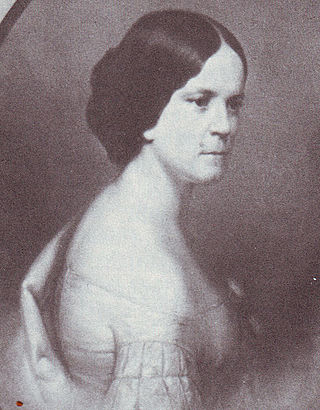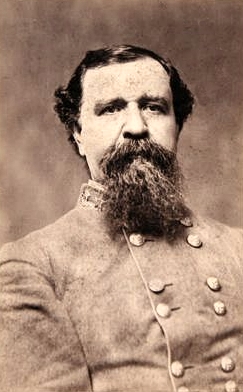
John Cabell Breckinridge was an American lawyer, politician, and soldier. He represented Kentucky in both houses of Congress and became the 14th and youngest-ever vice president of the United States. Serving from 1857 to 1861, he took office at the age of 36. He was a member of the Democratic Party, and ran for president in 1860 as a Southern Democrat. He served in the U.S. Senate during the outbreak of the American Civil War, but was expelled after joining the Confederate Army. He was appointed Confederate Secretary of War in 1865.

Thomas Leonidas Crittenden was an American statesman, politician, soldier and lawyer from the U.S. state of Kentucky. He served as a general for the Union during the Civil War. His family was fairly typical for Kentucky, in that he and his father supported the Union during the war, but his elder brother fought for the Confederacy.

Theodore O'Hara was a poet and an officer for the United States Army in the Mexican–American War, and a Confederate colonel in the American Civil War. He is best known for the poems "Bivouac of the Dead", which is quoted in many cemeteries, and "The Old Pioneer".
The Orphan Brigade was the nickname of the First Kentucky Brigade, a group of military units recruited from Kentucky to fight for the Confederate States of America during the American Civil War. The brigade was the largest Confederate unit to be recruited from Kentucky during the war. Its original commander was John C. Breckinridge, former United States vice president, and Kentucky's former senator, who was enormously popular with Kentuckians.

Richard Hawes Jr. was a United States representative from Kentucky and the second Confederate Governor of Kentucky. He was part of the politically influential Hawes family. His brother, uncle, and cousin also served as U.S. Representatives, and his grandson Harry B. Hawes was a member of the United States Senate. He was a slaveholder.

George Washington Johnson was the first Confederate governor of Kentucky. A lawyer-turned-farmer from Scott County, Kentucky, Johnson, a supporter of slavery who owned 26 slaves, favored secession as a means of preventing the Civil War, believing the Union and Confederacy would be forces of equal strength, each too wary to attack the other. As political sentiment in the Commonwealth took a decidedly Union turn following the elections of 1861, Johnson was instrumental in organizing a sovereignty convention in Russellville, Kentucky, with the intent of "severing forever our connection with the Federal Government." The convention created a Confederate shadow government for the Commonwealth, and Johnson was elected its governor. This government never controlled the entire state though it controlled about half the state early in the war, Kentucky remained in the Union after 1862 throughout the rest of the war.

Louisville in the American Civil War was a major stronghold of Union forces, which kept Kentucky firmly in the Union. It was the center of planning, supplies, recruiting and transportation for numerous campaigns, especially in the Western Theater. By the end of the war, Louisville had not been attacked once, although skirmishes and battles, including the battles of Perryville and Corydon, Indiana, took place nearby.

The Confederate government of Kentucky was a shadow government established for the Commonwealth of Kentucky by a self-constituted group of Confederate sympathizers and delegates sent by Kentucky counties, during the American Civil War. The shadow government never replaced the elected government in Frankfort, in which the state legislature had strong Union sympathies while the governor was pro-Confederate. Neither was it able to gain the whole support of Kentucky's citizens; its jurisdiction extended only as far as Confederate battle lines in the Commonwealth, which at its greatest extent in 1861 and early 1862 encompassed over half the state. Nevertheless, the provisional government was recognized by the Confederate States of America, and Kentucky was admitted to the Confederacy on December 10, 1861. Kentucky, the final state admitted to the Confederacy, was represented by the 13th (central) star on the Confederate battle flag.
The Breckinridge family is a family of public figures from the United States. The family has included six members of the United States House of Representatives, two United States Senators, a cabinet member, two ambassadors, one United States Vice President, and one unsuccessful candidate for United States President. Breckinridges have served as college presidents, prominent ministers, soldiers, and theologians and in important positions at state and local levels. The family was most notable in Kentucky and most prominent during the 19th century, during nearly one third of which a member of the family served in the United States Congress.

Peter Augustus Porter was a lawyer, politician, and member of the Breckinridge family and a Union Army colonel in the American Civil War. He died in the Battle of Cold Harbor.

Joseph Cabell Breckinridge Sr. was a Union Army officer from Kentucky during the American Civil War. In later life, he became a brigadier general in the U.S. Regular Army and Inspector General of the Army as well as a major general of volunteers in the Spanish–American War.
The 3rd Kentucky Infantry Regiment was a volunteer infantry regiment that served in the Confederate States Army during the American Civil War. It was part of the First Kentucky Brigade through August 1862.

Mary Cyrene Breckinridge (née Burch; August 16, 1826 – October 8, 1907) was the wife of John C. Breckinridge and served as the second lady of the United States from March 4, 1857, until March 4, 1861, while her husband was the 14th vice president of the United States.

Ethelbert Dudley Warfield, D.D., LL.D. was an American professor of history and college president who served as president of Miami University, Lafayette College and Wilson College. As Miami University's youngest president, he was noted for bringing football to Miami where its first intercollegiate game was played against the University of Cincinnati in 1888.

Tyree Harris Bell was a Confederate States Army brigadier general, during the American Civil War.

Thomas Hart Taylor was a Confederate States Army colonel, brigade commander, provost marshal and last Confederate post commander at Mobile, Alabama, during the American Civil War. His appointment as a brigadier general was refused by the Confederate Senate after Confederate President Jefferson Davis failed to nominate Taylor, apparently following Davis's appointment of Taylor to the rank. Nonetheless, Taylor's name is frequently found on lists and in sketches of Confederate generals. He was often referred to as a general both during the Civil War and the years following it. Before the Civil War, Taylor served as a first lieutenant in the 3rd Kentucky Volunteer Infantry Regiment during the Mexican–American War. After that war, he was a cattle driver, farmer and lawyer. After the Civil War, he was engaged in business in Mobile, Alabama for five years, and after returning to Kentucky, was a Deputy U.S. Marshal for five years and was chief of police at Louisville, Kentucky, for eleven years.

Benjamin Hardin Helm was an American politician, attorney, and Confederate brigadier general. A son of Kentucky governor John L. Helm, he was born in Bardstown, Kentucky. He attended the Kentucky Military Institute and the West Point Military Academy and then studied law at the University of Louisville and Harvard University. He served as a state legislator and the state's attorney in Kentucky. Helm was offered the position of Union Army paymaster by his brother-in-law, President Abraham Lincoln, a position which he declined. Helm joined the Confederate States Army. As a brigadier general, Helm commanded the 1st Kentucky Brigade, more commonly known as The Orphan Brigade. He died on the battlefield during the Battle of Chickamauga.

The 1st Florida Infantry Regiment was an infantry regiment raised by the Confederate state of Florida during the American Civil War. Raised for 12 months of service its remaining veterans served in the 1st (McDonell's) Battalion, Florida Infantry from April 1862 on. In August the depleted battalion was consolidated with the 3rd (Miller's) Battalion into the reorganized 1st Florida Infantry Regiment again. In December 1862 it merged with the 3rd Florida Infantry Regiment and received the form it kept till the war's end as the 1st and 3rd Consolidated Florida Infantry Regiment. Fighting as part of the Army of Tennessee in the Western Theater of the American Civil War it was surrendered on April 26, 1865.

The 20th Louisiana Infantry Regiment was a unit of volunteers recruited in Louisiana that fought in the Confederate States Army during the American Civil War. The unit began its existence as the 6th Louisiana Battalion in September 1861. The battalion was augmented to regimental strength in January 1862 at New Orleans and served during the war in the Western Theater of the American Civil War. The regiment fought at Shiloh, Farmington, and Perryville in 1862. After being reduced in numbers, the regiment was consolidated with the 13th Louisiana Infantry Regiment and served at Stones River, Jackson, Chickamauga, and Missionary Ridge in 1863. The 13th-20th Consolidated Louisiana fought at Resaca, New Hope Church, Ezra Church, and Nashville in 1864. The consolidation with the 13th Louisiana was discontinued in February 1865 and the regiment was re-consolidated with other units. It fought its final battle at Spanish Fort one month before surrendering in May 1865.
Charles Henry Breckinridge was a U.S. Army officer from Kentucky during the American Civil War.















